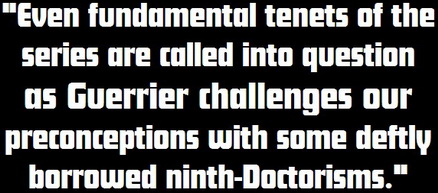|
| ||
|
WRITTEN BY SIMON GUERRIER
RECOMMENDED PURCHASE OFFICIAL BBC PAPERBACK (ISBN 0-563-48633-3) RELEASED IN NOVEMBER 2005.
BLURB
24TH June 2006. The TARDIS
has landed in London. Ian and Barbara are almost back home. But this isnít
the city they knew. This city is a ruin, torn apart by war. A war that the
British are losing.
With his friends mistaken for
vagrants and sentenced to death, the Doctor is press-ganged into helping
perfect a weapon that might just turn the tables in the war. The British
Army has discovered time travel. And the consequences are already
devastating.
What has happened to the
world that Ian and Barbara once knew? How much of the experiment do the
Doctor and Susan really understand?
And, despite all the Doctor
has said to the contrary, is it actually possible to change history?
|
| |
|
|
| |
|
The Time Travellers NOVEMBER 2005
If ever this series of books is resurrected, Simon Guerrierís dark and devilish debut novel should be used as the yardstick for future releases. I say this as The Time Travellers does a tremendous job of evoking the sights and sounds of the era in which it is set - which, for many, is the principal reason for purchasing a book like this one - but at the same time it still manages to push the envelope in new and even quite audacious ways.
Guerrier has a remarkable handle on the monochrome era of the series. The first half of the novel in particular is aromatic, evoking the unease and dread of The Dalek Invasion of Earth, as well as the moody atmosphere that made serials like The Web of Fear so popular. Whatís more, Guerrier absolutely nails the structure and pace of a 1960s six-parter - the early loss of the TARDIS and the speed with which the Doctor and his companions become swept up in events positively reek of the seriesí early years.
The author also portrays the original cast faithfully, though he does stretch their elastic as far as it will go before reining them back in in time for the storyís conclusion. Susanís farewell in the ensuing Dalek Invasion of Earth is foreshadowed beautifully, the Doctorís reaction to her troubles here segueing perfectly into that storyís milestone final scene. Similarly, Ian and Barbaraís understated romance is handled with comparable delicacy, the explicit reveals of The Eleventh Tiger giving rise here to a much gentler and really much more poignant story.
In terms of the storyline itself, the novelís unassuming title conceals an inordinately complex and consistently bewildering tale. Itís an inspired one though, and one that I would certainly argue is worth a few hours of aggravated head-scratching. In essence, our heroes arrive in a post-apocalyptic 2006 where a group of humans are conducting time travel experiments with a view to undoing the cataclysm that brought them to the brink of destruction. Clearly 21st century humans shouldnít be messing about with time travel technology, which begs the inevitable question, where did they get it from?
The readerís patience is ultimately paid off with what I think itís fair to say is an openly fan-pleasing reward, but this payoff has to be worked for, and even when it does come Guerrier doesnít spell anything out explicitly. As such those tackling this novel without any knowledge of the events of The War Machines (and indeed a number of other Doctor Who television serials) will struggle to derive any meaningful satisfaction from the storyís resolution, but I donít think that many readers will fall into that category. Indeed, most of this bookís stalwart readership will surely lap up the authorís flurry of oblique references (ďmachine-men living at the South PoleĒ) and cryptic links - I know that I certainly did.
Overall then, though it is extraordinarily hard work at times, The Time
Travellers is probably one of the most gratifying Doctor Who
novels that Iíve ever read. I wouldnít advocate reading it in small chunks
as I did though; this is one that you really need to set aside a few hours
for so that it may be properly appreciated (and, I dare say, followed).
|
||
|
Copyright © E.G. Wolverson 2006
E.G. Wolverson has asserted his right under the Copyright, Design and Patents Act 1988, to be identified as the author of this work. |
||
|
This novelís blurb offers no clues as to its placement, however as its opening scene picks up from where the television serial Planet of the Giants left off we have placed it accordingly.
|
||
|
Unless otherwise stated, all images on this site are copyrighted to the BBC and are used solely for promotional purposes. ĎDoctor Whoí is copyright © by the BBC. No copyright infringement is intended. |
||

.jpg)
.jpg)
.jpg)
